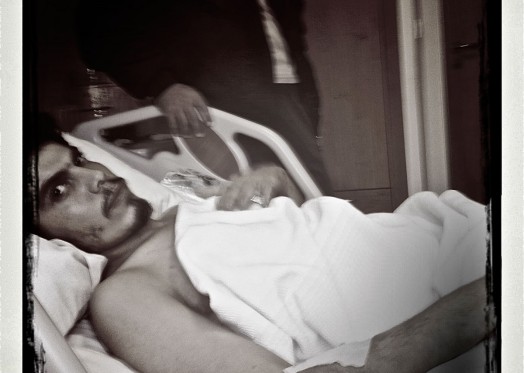At the Syrian-Turkish Border

I stand on the rooftop of a house in Guvecci, a small village South of Antakya, a few yards from the borderline. I can see the fortified Turkish military positions, the control towers and the mined fields, the winding barbed wires cutting through the hills and the olive groves. And hear the sound of gunfire cracking in the distance. Each day the war in getting closer to this bucolic rural region. More than 20,000 refugees live in seven strictly guarded tented camps, and more are coming as the shelling intensifies in Idlib and Deraa where the Syrian army is pounding the insurgents with artillery and tanks. In Antakya Defne Hospital I meet the wounded. Some are apparently civilians, some belong to the Free Syrian Army, others don't hide their Salafist belief. They fight with few weapons and less ammunitions, sneaking across the border without being bothered by the Turkish: they move in small groups of 10-15 men and try to ambush the enemy wherever they can. Contacts with their commanders in Turkey are done by radio and mobile phones, but the whole chain of command appears to be flawed. They also claim - although with no evidence - that Iranians soldiers and advisors are operating inside Syria. Adding to the confusion, divisions are deepening in the insurgents' camp, with the Kurds distancing themselves and the leadership unable to find a common ground and a credible strategy. With no foreign intervention in sight it looks like the political stalemate and the bloodshed will last for months, giving more time and more chances of survival to the regime in Damascus. A grim outlook for the civilian population, whose hopes for a respite are now pinned on the Annan plan: a daily few hours' ceasefire to allow a humanitarian rescue. Everybody is playing a risky game out here. Even journalists. Last Saturday two independent Algerian reporters, Nasim Entriri and Walid Blidi, were shot dead by the Syrian army after they crossed the border with Turkey through a checkpoint near Azmareen village. In the Reyhanli refugee camp I meet Ahmed Alawi, a fighter with the Free Syrian Army: he was with the two journalists when they were killed. He claims that when the fire ceased the insurgents recovered the bodies and buried them on the spot. But other sources say the corpses are now in custody of the Syrian security forces in the municipality of Zarzur, fifteen kilometres from the Turkish border.





